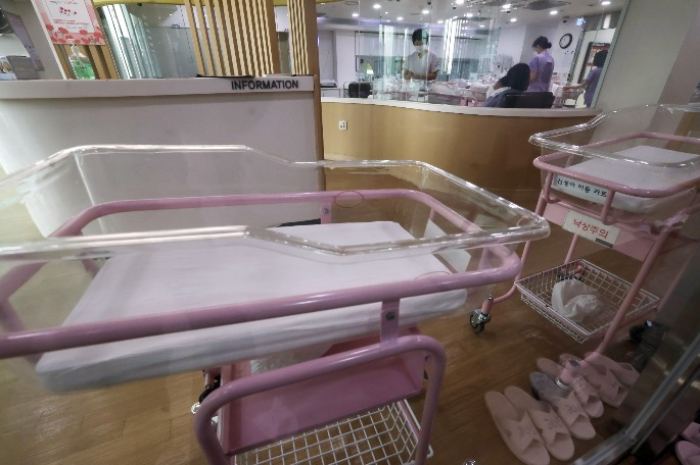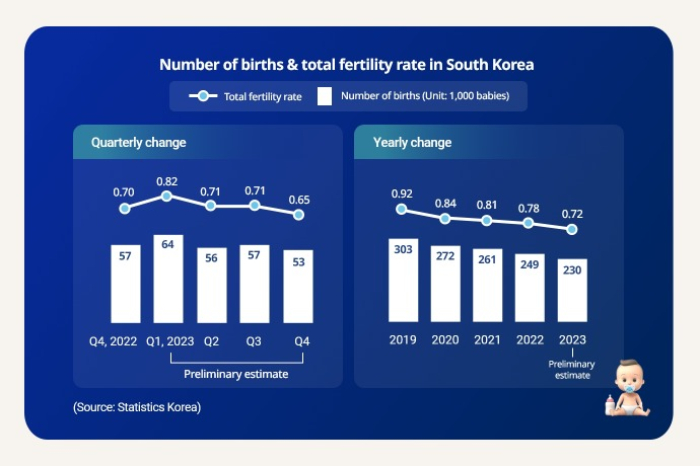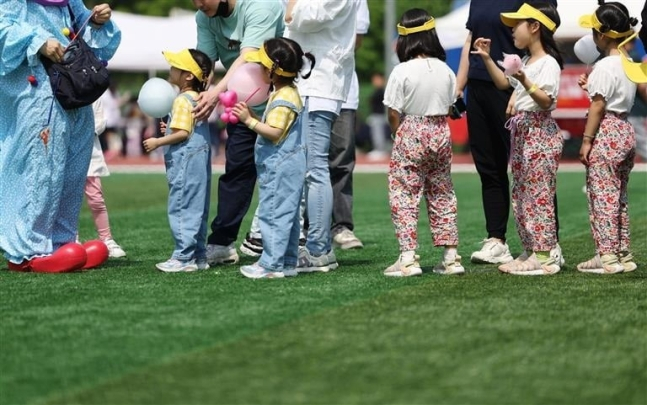Economy
S.Korea’s fertility rate hits new world-record low in 2023
The number of births in Asia’s No. 4 economy also halved in a decade, hitting a historic low
By Feb 28, 2024 (Gmt+09:00)
4
Min read
Most Read
LG Chem to sell water filter business to Glenwood PE for $692 million


KT&G eyes overseas M&A after rejecting activist fund's offer


Kyobo Life poised to buy Japan’s SBI Group-owned savings bank


StockX in merger talks with Naver’s online reseller Kream


Meritz backs half of ex-manager’s $210 mn hedge fund



Trapped in a downward spiral, South Korea saw the country’s total fertility rate hit a new record low of 0.72, also again the world’s lowest, last year, bracing for a fast-approaching so-called demographic cliff as a growing number of people choose not to have children.
According to Statistics Korea’s data on Wednesday, the country’s total fertility rate in 2023 fell to a historic low of 0.72, down 0.06 from the previous record of 0.78 in 2022.
Last year’s fertility rate was again the world’s lowest, breaking the record marked the year earlier.
The total fertility rate measures the average number of children a woman is expected to give birth to in her lifetime.
It recorded 0.82 in the first quarter of last year but fell to 0.71 in the following two consecutive quarters and then to 0.65 in the final quarter, marking the first time the country’s quarterly total fertility rate has dipped below 0.7.
Worse yet, the country’s number of births also hit a historic low of 230,000 in 2023, down 7.7% from the year prior and halved from a decade ago.

COVID-19 was largely blamed for the accelerated fall in the country’s births, according to the state-run national statistics organization.
“During the COVID-19, the number of marriages plummeted, which had a spillover effect on the country’s births last year,” an official of Statistics Korea said, projecting a rebound in newborns next year or a year after next year as the number of marriages has picked up since late 2022.
The Korean government pins high hopes on parents in their early 30s who are also the so-called echo boomers, the largest generation of young people since the 1960s and the genetic offspring and demographic echo of their parents, the baby boomers.
The Korean echo boomers were those born between 1991 and 1996.
But many demographic experts remain skeptical about whether the government’s hopes can be realized given the current decline in both fertility and birth rates and the demographic composition.
FREEFALL SHOWS NO SIGN OF STOPPING
Korea’s births reached its peak of about 640,000 in 2000, the nearly final year of the echo boomer generation, and declined to about 470,000 in 2010 when the youngest group of Generation X, the demographic cohort mainly born in the 1970s, joined older Gen-X parents.

In 2020 when the youngest women among the so-called millennials born between 1981 and 1996 entered their prime childbearing years, Korea’s births further dropped to the 270,000 level.
According to the data, the number of the country’s births shrank by 200,000 every 10 years since 2000. Especially, the decline in the number of newborn babies has accelerated since 2015 when the number of working women sharply increased.
The trend is backed by the latest survey conducted by Ipsos upon request by The Korea Economic Daily this month, which showed that more than 60% of 1,000 working women who joined the survey responded that they choose to remain childless.
Births among the country’s echo boomers’ births dropped the most, according to data.
The number of newborns by parents in their early 30s decreased by 8,100, accounting for about 40% of last year’s total fall of 19,200.
Their marriages also dropped. The number of marriages per 1,000 men aged from 30 years to 34 years dropped 0.2 on-year to 40.1 last year. That per 1,000 women from 25 years old to 29 years old fell by 1.3 to 34.4 over the same period.

CHILDLESS PARENTS
Even when younger-generation couples get married, many of them choose to be child-free.
The fertility rate of couples in their first marriages of five years or less as of Nov. 1, 2022, fell to an all-time low of 0.65, Statistics Korea unveiled last December.
Those couples without children accounted for a record high of 46.4% of the total, up 0.6 percentage point, while those couples with one child or more fell to 53.6%.
Households with "double income, no kids" (DINKs) made up 50.2% in 2022, staying above half for a second straight year with 50.4% the previous year. Couples with double incomes had only 0.54 child on average, lower than the 0.73 of households with single incomes.
Last year, the total fertility rate in the country’s entire 17 administrative cities and provinces dipped below 1.0.
The fertility rate of Sejong City, which was the only city in the country recording a fertility rate of over 1.0 in 2022, finally fell to 0.97 in 2023.
Seoul recorded the lowest fertility rate of 0.55 in the country.
The government forecast this year’s births to further contract from last year’s record low of 230,000.
Write to Se-Min Huh at semin@hankyung.com
Sookyung Seo edited this article.
More to Read
-
 EconomySome 6 out of 10 working Korean women choose to be child-free
EconomySome 6 out of 10 working Korean women choose to be child-freeFeb 27, 2024 (Gmt+09:00)
4 Min read -
 EconomyS.Korean newly married couples’ birth rate at record low
EconomyS.Korean newly married couples’ birth rate at record lowDec 11, 2023 (Gmt+09:00)
3 Min read -
 EconomyS.Korea’s birth rate at record low despite rebound in marriages
EconomyS.Korea’s birth rate at record low despite rebound in marriagesAug 30, 2023 (Gmt+09:00)
2 Min read -
 EconomySeoul to lower bar for multi-child family subsidies to raise birth rate
EconomySeoul to lower bar for multi-child family subsidies to raise birth rateMay 16, 2023 (Gmt+09:00)
1 Min read -
 Culture & TrendsHigh- and low-income S.Koreans alike reluctant to have babies: Survey
Culture & TrendsHigh- and low-income S.Koreans alike reluctant to have babies: SurveyApr 18, 2023 (Gmt+09:00)
3 Min read -
 EconomyS.Korea hits historic low fertility rate in 2022, adding to economic woes
EconomyS.Korea hits historic low fertility rate in 2022, adding to economic woesFeb 22, 2023 (Gmt+09:00)
2 Min read
Comment 0
LOG IN


